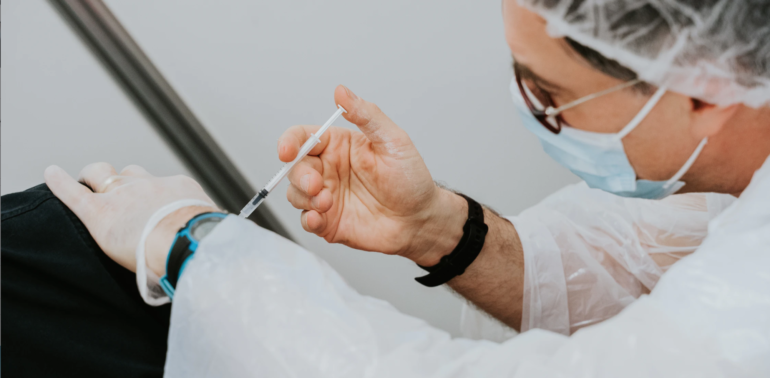
Does Orthodox Jewish Law Recommend the COVID Vaccine?
Hi JITC-
Does Orthodox Jewish law recommend the COVID vaccine?
-Sruly
Dear Sruly-
This is an important topic and we absolutely should discuss it but I know what comes with this territory: hate comments.
I get it; there are those who oppose vaccinations. The rest of us know what you have to say but we disagree. The person who started the modern “anti-vaxxer” movement, Andrew Wakefield in a 1998 Lancet study, was discredited and his findings, alleging that the MMR vaccine causes autism in children, found to be fraudulent. All reputable medical authorities consider vaccinations to be safe and effective. (The idea that the vaccine for Covid-19 contains government tracking chips is simply ridiculous. If you’re so worried about the possibility of being tracked, I hope you don’t use a cell phone, a MetroCard, an EZ Pass or a credit card!)
Here we’re pro-vaccination. That’s our starting point. We aren’t going to question the vaccine itself, we’re just going to discuss the Jewish perspective on vaccines. Yes, vaccines – plural – because the halachic discussion started as soon as vaccines were discovered.
The story of vaccinations goes back to the smallpox epidemic of the late 18th century, in which millions died. Then, the idea of inoculating people with a mild form of the disease was new and counterintuitive. The procedure was not without risk, however, and a small percentage of those so inoculated died. The halachic dilemma at that time was whether or not it was permissible to expose healthy people to a disease with the intention of ultimately effecting a cure. Rabbi Yisrael Lifschitz, AKA the Tiferes Yisrael (Germany, 18th-19th centuries), encouraged vaccinations despite the risk on the basis that the risk of the disease was much more severe. He wrote that one is permitted to expose himself to a potential danger in an attempt to save himself from an even greater danger (Boaz, Yoma 8:3).
Not only that, vaccinations in the early days were not delivered in your local doctor’s office or pharmacy. Rather, they were delivered by traveling practitioners who made brief stops in each town. It was entirely possible that one’s town might be inoculated on a Shabbos. While we normally only permit Shabbos to be overridden for one who is sick, many authorities permitted one to be vaccinated on Shabbos rather than miss their opportunity. This was deemed necessary in order to protect people from the very real threat of smallpox. This viewpoint is also maintained by contemporary authorities. Rav Shlomo Zalman Auerbach (d. 1995) allowed one to be vaccinated on Shabbos if failure to do so would cause one to potentially lose the opportunity for years (Minchas Shlomo 2:29). Rav Eliezer Waldenberg (d. 2006) even permitted one to receive a tetanus shot on Shabbos.
Nowadays, virtually all authorities either allow or require routine vaccinations. There are a number of reasons for this, including: the prohibition against unnecessarily placing our own lives in danger (Mishneh Torah, Hilchos Rotzeiach, chapters 11-12) and our obligation to protect others from harm (Leviticus 19:16).
Rav Yosef Shalom Elyashiv (d. 2012) differentiates between reasonable risks, which are permitted, and unreasonable risks, which are prohibited. Every time we get into a car, there’s an element of risk but society has accepted doing so as responsible and safe behavior. Things that society considers irresponsible and dangerous, however, are prohibited even if there’s a relatively low risk. Failure to vaccinate is considered reckless endangerment to oneself and others. Accordingly, Rav Elyashiv rules that vaccinations are mandatory. Not only that, Rav Elyashiv ruled that the parents of vaccinated children have the right to insist that other children be vaccinated in order to attend class.
Some have tried to justify not vaccinating based on the concept that “God protects the simple” (Psalms 116:6), which refers to potential dangers about which one may be unaware. Actually, this concept really supports the opposite position, i.e., that one should vaccinate. Rav Moshe Feinstein (d. 1986) ruled that one can only rely on “God protects…” when no alternative exists. In the case of vaccinations, there’s a treatment to protect oneself from disease, so one would be obligated to take it (Iggros Moshe, EH 4:10). Furthermore, Rav Chaim Ozer Grodzinski (d. 1940) teaches that the concept of “God protects…” only applies where there’s a low risk of danger (Achiezer 1:23). The pandemic has a much higher degree of risk than the vaccine so, if anything, “God protects…” would apply to those who have been vaccinated, no to those trying to avoid it.
Here’s more to consider:
- Both the aforementioned Rav Elyashiv and Rav Hershel Schachter shlita rule that when a vaccine is required by a legitimate government, the rule of dina d’malchusa dina (that we are obligated by secular law) applies;
- A letter jointly signed by numerous authorities including Rav Zalman Nechemiah Goldberg (d. 2020) rules that if most doctors say that one must vaccinate, it becomes the halacha. It may even be more compelling than most halachos because we act more stringently in cases of danger than we do regarding mere prohibitions;
- Failure to vaccinate is a chillul Hashem – a desecration of God’s Name. Consider all the negative press that certain Jewish communities received for failure to social distance during the pandemic;
- The Rema, who lived in the 16th century, ruled that people should flee a city when a plague strikes (YD 116:5). Rav Osher Weiss shlita declared vaccination to be the modern equivalent of fleeing the city;
- Rav Moshe Sternbuch shlita ruled that one must follow the clear majority of medical practitioners who advocate vaccination. One may not follow a minority opinion that advises otherwise as doing so endangers others;
- Rav Weiss and Rav Sternbuch have both called vaccination “pikuach nefesh” – saving a life – while numerous authorities have compared one who refuses to vaccinate with a rodeif – one who pursues others with the intent to kill.
Most of what was written here was said about vaccination in general, not specifically about the Covid vaccine. If anything, the case for the Covid vaccine is even stronger as Covid presents a clear and present danger, as opposed to a hypothetical that could happen.
There’s a lot more that could be said but the point is clear: virtually every Torah authority allows, recommends or outright requires us to be vaccinated. This is necessary to protect not only ourselves but others as well. Jews seeking a religious exemption from vaccination are misguided and schools are permitted to bar admission to those who refuse to comply (except for those rare few who have legitimate medical reasons not to vaccinate).
Sincerely,
Rabbi Jack Abramowitz
Educational Correspondent
Follow Ask Rabbi Jack on YouTube
If you found this content meaningful and want to help further our mission through our Keter, Makom, and Tikun branches, please consider becoming a Change Maker today.








3 comments
Sort by
Is it a mitzva for me to try to convince a friend of mine who’s also an Orthodox Jew to get the vaccine?
I think it would be a mitzvah to encourage ANYONE to get the vaccine.
It’s important to note that the modern Covid vaccines do not contain any active part of the virus itself. They either contain pieces of the “S” protein spike on the outside of the virus (which the virus uses to enter your cells) or, in the case of Moderna and Pfizer, they contain instructions for your body itself to produce the S protein. There is no way the S protein can harm you, but by developing antibodies against it, you are able to disarm the actual virus if it enters your body. Reactions that we have seen are unfortunate side effects of ramping up the immune system itself, typically fever, aches, chills and all the other things you get when your body is responding to an immune challenge, just as when you are fighting off an actual disease.